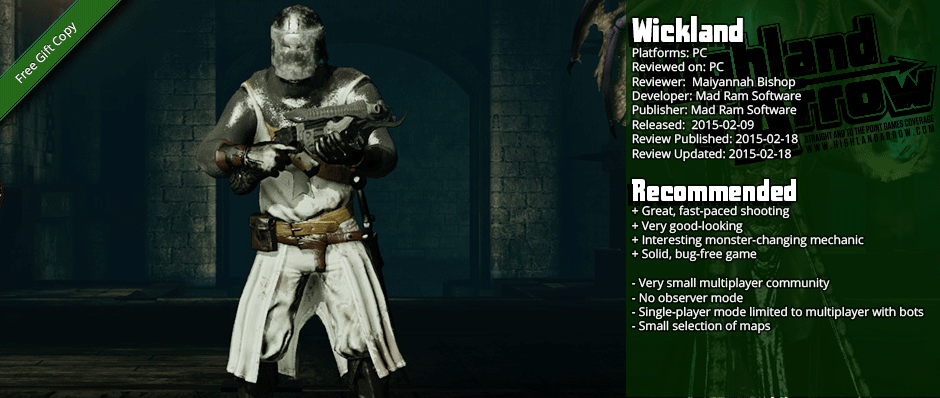

Editor's Note: Maiyannah's copy of this game was given to her as a gift by a reader.
Wickland is a first-person arena shooter developed and published by Mad Ram Software. It bills itself as a return to "old school" shooter games, so the ultimate question that comes to mind is whether it lives up to that somewhat lofty claim or not. I'm happy to report that the answer is mostly "yes", but that comes with some qualification.
The big problem with Wickland becomes readily evident:
You get dropped into the game with no explanation of anything
So let me preface this review with a bit of a disclaimer or an explanation: I'm going to get a little bit more into the minutiae of the mechanics of Wickland here than I would for most reviews because of that. There isn't a proper single-player mode to help you learn the basics of the game, and so I suspect a few people may be turning to these reviews for more than just opinions on those mechanics. So lets dig in, with apologies to those just looking for opinions (scrolls down to the next heading if that's what you're here for!)
Please keep in mind this might change if you're reading this review some time after release, or there may be new forms added.
The key mechanic of Wickland is that rather than getting new weapons per se, you get monsters you morph into instead, reminiscent of the old DOS shooter Shadowcaster. You start as a generic crusader with some sort of automatic-fire crossbow, and you find the different forms through the level you are able to switch through them, each of which has a primary ability and a secondary ability, not all of which are weapons.
This breaks down as follows:
- Crusader - Original form - primary: automatic-fire crossbow, secondary: burst-fire crossbow with knockback
- Lizard - Assassin form - primary: become invisible, secondary: powerful melee attack
- Ape - Medium-ranged form - primary: single shot, scattershot "shotgun", secondary: shoots both guns, shorter range/higher scatter
- Lycan - Artillery/indirect fire form - primary: lob a bomb that explodes after a time, secondary: lobs a bomb that you can then manually detonate
- Goatman - Long-ranged form - primary: shoot an exploding skull with splash damage, secondary: shoot a skull that will home in on enemies
- Fish - Area attack form - primary: shoot a sustainable bolt of lightning, secondary: shoot a large-AOE ball of lightning
- Scorpion - Sniper form - primary: shoots a railgun-like bolt with high single-target damage, secondary: shoot spines that rebound off walls
- Ixi - Generalist form - primary: shoots a single mid-range bolt of medium damage, secondary: spread-fire version of the primary.
You have a health bar, and each of the forms has its own "life" which acts as (and is supplemented by) armour. When that form's "life" runs out (unless you're Crusader), you will change to the next available form, or the Crusader, if you have no other forms. Most attacks will damage both health and the form, and if your health runs out you die, irrespective of how much "armour" you might have left.
Pickups are a familiar fare for veterans of arena shooters: basic health and life pickups as well as larger ones. Armour pickups add the forms "health" of the present form, which is somewhat of a difference to normal shooters, but otherwise, the old knowledge applies. You'll also want to stay highly mobile through play, and the maps available are the familiar maze-like fare and fairly well-designed.
Lack of a singleplayer game beyond bots is a bit of a problem
This kind of dovetails betwen the two major problems I would say the game has - first of all, in the traditional FPS, the singleplayer campaign was a way to introduce new weapons and the increasingly-complex map designs and mechanics to the player over the course of a game so that they could learn the game, and secondly, the multiplayer community for Wickland at present is very aggressively small, so as to be pretty much be non-existent sometimes, which would not be as severe a problem if there were that singleplayer. At present, there is a practice mode, but it's pretty much just the multiplayer with bots.
That practice mode doesn't really do much to address either problem, as you're left to experiment on the fly to try to determine how things work, and playing simply multiplayer maps with bots gets boring very quickly.
Wickland's multiplayer however, feels and plays great
Make no mistake, if you came to Wickland looking for the old Quake multiplayer experience, then you will likely not be disappointed by the game. This is the fast-paced arena shooter you remember, complete with it's maze-like levels and constant close encounters of the painful kind. While it's not steeped in the same kind of gore as some early shooters, it's very frenetic and the "armour" mechanic gives it a pretty aptly-designed time-to-death that means you're not too frequently offed without any chance to respond or evade. The movement is the same kind of side-strafing and constant motion you might remember, and the introduction of things that can knock you about rewards players who are moving around skillfully and aware of their surroundings.
The maps presented, while small in number (six at time of writing) are all pretty brilliantly-designed mazes with teleporters, jump pads, and the like, and they all have paths and the like through you';ll find yourself wanting to learn and get down to be most successful in the multiplayer. If I had any criticism of them its that they all sit around the smaller end of a mid-sized map and there's no real large map for a massive many-player showdown. The usual server size of 16 sits at just about where the maps are comfortable with, but I'd love to see 24 or 32 player games, as I have fond memories of how utterly mad such games used to get with arena shooters.
I already touched on the prime problem with Wickland's multiplayer, which is unfortunately while not a fault of the game itself, still nonetheless an inextricable part of the gameplay - the lack of any large community. You really do need friends to get the full enjoyment out of this game, but its great fun if you do. The other main problem is the lack of any observer mode or other esports type functions. A lot of people really enjoy watching this kind of high-skill game played at its best, and this is why many games developed such "observer", or more recently "caster" modes. It's kind of a notable absence, since most iterations of the classic Quake and Unreal games had such modes, as did Half-Life which followed in their footsteps.
The game's art direction and visual fidelity is a bit derivative but gorgeous
I was actually a bit surprised, if I am being honest, in how good Wickland looks. This is a UDK game, so the engine is based on the fairly dated UE3, but it looks great, especially in motion. The design of it is a fair bit derivative, playing off the pseudo-medieval themes of the original Quake and it's successors, but the level designs tend to make good use of some differing palettes to keep it from getting too overly-monotonous, and in general, it looks pretty great in motion. If you stop to look and lick some wall textures you'll find them somewhat console-level of quality, but you'll probably also find yourself promptly smeared against them, so there's that. It's a game where you don't get to stop and smell the roses so it doesn't matter overmuch.
There are plenty of options for visual fidelity, but as you might expect from a UDK game, it runs with a high frame rate on basically anything short of a potato. They basically have all the options a UDK game can have without some pretty significant reprogramming of the engine, and I especially appreciate the Field-of-View options and the ability to turn off motion blur which help keep such a mobile game from being a simulation sickness prescription.
All of that said, its a good game, that with a more active community, something of a single-player, and more multiplayer options and maps, could easily be considered on the same lofty footing as the classics it imitates. For the price point, it certainly worth the look if you have some friends to play with.</p


